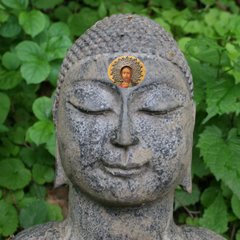Perhaps yesterday’s quote should have been titled, “live, ponder, study.”
I say that because as I sit here and live, I ponder just what it is that I study.
This morning, before my sitting I was reading and studying “The Tantric Mysticism of Tibet” (John Blofeld,) which I gratefully received from Paul Reynard’s library after he died.
The book is filled with ideas. Because I like to study ideas, I certainly don’t discount or disparage the practice of acquiring information in this way, but the majority of my study within this life is no longer centered around ideas taken in in this manner. It is centered, more and more, within the direct experience of immediately existing conditions.
For example, right now, I find myself living within conditions in front of my computer in my hotel room in Shanghai. While the ideas I am delineating here in the blog are interesting to me, the center of gravity of my interest lies in the physical sensation I find within me, and the state of the energy within this body.
So I study the inner structure, its receptivity, and the activity level of the various parts in relationship to each other. The observation of--and investment in--these situations and conditions helps to feed the relationship between the parts.
They actually do not need that much help from me; insofar as they are able to function, they function rather well on their own, and they know much better than I do what is needed. It is the support from my attention that can help feed them, and above all, "my" role--the role of effort within this life--is to provide them with food.
So here I am, within conditions, studying the tensions within the body and the interrelated nature of the inner and outer experience. I find that I need to remain much more aware of both these states: the various vibrations of the inner state, as determined by the centers, and the arrival of the vibrations of the outer state.
There are these two sets of conditions. My attention lives at the juncture between them.
This attention that is necessary cannot be manufactured; it is born. (Henry Brown used to refer to it as the "effortless effort.") It is in my attendance at this birth that I make effort and do work. I am not the world’s most adept midwife; I am clumsy, and (always, forever) new at it, and don’t know that much about the process.
I do know, however, that the process of birth is not without pain, and that babies need diligent attention and care.
Resident within this body, I seek and find the nodes of nourishment and the areas where food is available. I work with what I have; I try to peel my oranges piece by piece and eat them slice by slice, not crush them to extract the juice. Force doesn’t work well here.
So this is what I study: my organic conditions. Not my thoughts. Not my constructions, manipulations, speculations, or opinions. Again and again, I return to the organic conditions, to see what relationship I have to the organic sense of my being. This kind of study isn’t made up of ideas or theories. It is constructed from actual living relationship.
As it happens, I am currently in touch with some people who are working on the Gurdjieff ideas in Beijing. By happy coincidence, some of them are going to come down to Shanghai to meet with me next week.
This is very interesting, because I don’t know much about what is going on with the Gurdjieff ideas in China – and no one else I know at the New York Foundation seems to either. So as I write this, I find myself anticipating this meeting.
I see the mental construction being created within anticipation: imaginations about how it will be, what I might say, and so on. I need to remind myself that I have to live within the immediate experience of relationship, and present myself within the moment based on how I am.
This means the preparation for what will come does not consist (as it might in my usual business negotiations) of manufacturing prepackaged ideas for exchange, or of constructing (and hence arriving with) agendas, but simply of being spontaneously present within myself at the moment, as it arrives. After all, I know from experience that the circumstances will be different than I imagine them; the people will be different than I can imagine them; their questions will be different than I can imagine them.
In order to do the best job I can of being in relationship with them, I will need to turn to my own inner relationship first.
Once again, this brings me back to the question of how I study myself, and what I study.
Wrapping it up- in regard to the last two posts, and this one—
Engaged as I currently am in audio editing of the final outstanding chapter of Gurdjieff’s “Beelzebub’s Tales to His Grandson,” I was today reminded by the following commentary on understanding the law of three and the law of seven:
“Furthermore, an all-around awareness of everything concerning these sacred laws makes it possible for three brained beings…to become able, in the presence of all surrounding cosmic factors not depending on them, whether favorable or unfavorable, to ponder on the sense and aim of their own existence, and so to acquire data for the elucidation and reconciliation in themselves of that ‘individual collision,’ as it is called, which often arises in three-brained beings from the contradiction between the concrete results flowing from the process of all the cosmic laws and the results presupposed and even definitely expected by their ‘sane logic.’ And so, correctly evaluating the significance of their own presence, they become capable of being aware of the place truly corresponding to them in these common-cosmic actualizations.” (pages 691-692 of the Viking Arkana Edition, 1992.)
As Beelzebub further reports to Hassein, the study of these two laws, which must first and foremost be conducted according to inner experience, can lead a man to impartiality.
May your roots find water, and your leaves know sun.























